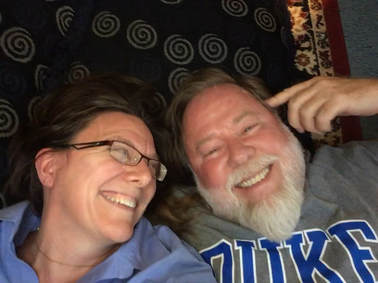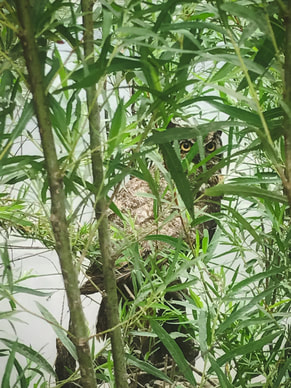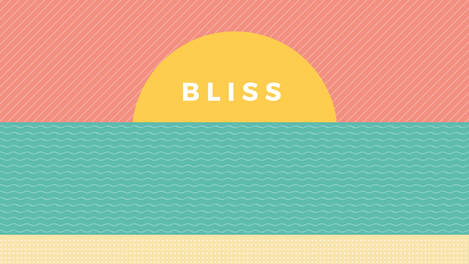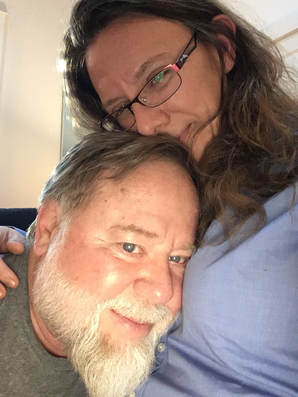 Frank and me this week, blissed out as usual, on our anniversary of meeting. Frank and me this week, blissed out as usual, on our anniversary of meeting. This daily practice celebrates the first time my Beloved sent me a Rumi poem. We had just met the day before, so this was his “follow up” message to our initial delight and amazement with each other. There wasn’t much preamble; just “Here are Coleman Barks and David Darling channeling Rumi’s comments on our time together yesterday! ‘What else could human beings want?’” with a link to a video of Rumi interpreter Coleman Barks reading a poem accompanied by a (somewhat distracting) cellist. Knowing him as I do now, I know that Frank was really saying, “Here is something that has kept me alive,” and asking, “Are you interested in a life of bliss, if it works like this?” In other words, he put his heart on a platter and sent it off to me, waiting for my reply with both his characteristic hopefulness, and also his awareness borne of experience that disappointment was a real possibility. I asked him about it this morning, and he said, “I remember feeling good about sending it and feeling that it was likely you’d resonate with it, and then feeling huge joy and relief when you did.” So what is it about poetry from a 13th century Sufi mystic that can help you recover from a toxic culture and learn to live in bliss? I really want to boil this down, because you could go on and on about all the different ways Rumi is amazing (and people do). But I want to persuade you here that a daily supplement of Rumi can change your life for the better. So I will say only one thing, but it is a big thing! Reading Rumi will teach you to recognize that bliss does not require the absence of sorrow. One of the false messages of our culture is that happiness requires the lack of sadness, worry, or trouble. When all the monsters are killed, and all our fortunes won, then we will live happily ever after. This is how our modern culture has passed fairy tales on to us. But that has never been how the oldest stories have ever gone. Let’s think about this for a minute. If everything had to be perfect to have bliss, no one could ever be blissful for long. Even if you have a moment of perfection, it is going to be fleeting by definition, because life is constant change. If we believe that happiness requires everything to be okay, we might strive our whole lives for those few brief moments when everything lines up, and then be devastated and heartbroken when those moments pass. We might even feel like giving up on life lived that way (I know I have). So that seems like a set up, but go a little further, and the seams rip out of the whole story. My father often quotes Carl Dean Selby in his sermons -- a resident at Muscatatuck State Hospital in Indiana who liked to say, “Love is trouble, because it makes you care.” Well, obviously, that’s true – a friend of mine once told me that raising children was like putting her heart out in the open street, and just hoping no one would run over it. The reason we have sorrow is because we care. But if love is trouble, and bliss is the absence of trouble, then bliss would require the absence of love! Set aside esoteric mysticism for a moment; that's not even logical. When you contemplate how we could be persuaded to believe something that not only isn’t good for us, but can’t be true, then you begin to understand how systems work. Because culture is, after all, just another system. And systems resist change. One way culture does that is to give us a filter that affects everything we see but is laborious to explain.  What? I can see fine! What? I can see fine! Imagine if someone were wearing glasses that distorted their vision but that they couldn’t discern. Now try to explain to them that everything they see is distorted; to do so you will have to describe these lenses they’re wearing, and through that description enable them to start perceiving the weight of the frames on their face or the effect of looking through them. It’s exhausting to describe in linear means, which is why philosophers like Alan Watts reach relatively few people. His insights are brilliant and right, but so complicated to read that it kind of makes your brain hurt. This is what Rumi accomplishes. He doesn’t describe the cultural lens; he describes the world through a different lens, and by doing so, allows you to begin to see the difference. Like Watts, Rumi explains how to release anxiety and how to find bliss -- and with basically the same answer. Rumi says that what makes life blissful and worth living is deep love and appreciation for the Divine sweetness of life. And this requires holding sorrow, and longing, and grief, because every moment of that sweetness must be fleeting. This is the true meaning of living in ecstasy. In a 1995 interview, Coleman Barks described our ecstatic core as the part of us that looks up in wonder. He said: “When I was a child in Chattanooga, sometimes in April … when that spring gold light would come, at the end of the day that’s just there for about ten minutes? You know what I’m talking about? in the South? That gold time? I could hardly stand it as a child. I would — I would lay down and hug myself. And I’d … say, “Mama, I’ve got that full feeling again,” just laying on the floor holding myself, you know? And she’d say, “I know you do, honey.” So, you know, I grew up … living in this beautiful, gorgeous place of the Tennessee Valley, and around all of these ecstatic teachers." Barks finds this upbringing notable because it is rare. Few of us have had ecstatic teachers like Barks's mother. Most of us have learned to push away or hurry along difficult emotions, even if the cost is pushing away or hurrying along ecstasy as well. Rumi says instead that we have to let ourselves feel the discomfort, the anxiety, the awareness of loss, in order to feel the joy. And he himself was no stranger to sorrow. His family were forced migrants staying ahead of the Mongol invasions. He lost his most beloved friend, possibly to murder by his own community in an effort to get him back to his culturally prescribed role as a jurist and teacher. His poems aren't rose-colored joy through denial of reality. They frankly address longing and grief -- but as part of ecstasy, not what keeps us from it. When you learn that you don't have to deny pain to claim joy, you realize you no longer have to feel guilty for being happy. That idea is just another bit of cultural gaslighting. The idea that our goodness is somehow calibrated to our outrage or despair serves to burn out activists (if not kill us with stress). One of my most powerful mentors, Cynthia Brown, used to say, "Don't mess with my blessing!" Just as fierce as her commitment to social justice was her certainty that joy is part of the revolution. Living in bliss does require sitting with uncertainty. Letting go of the story that happiness comes from things working out also means acknowledging that things might not work out. That's really the story we're in thrall to -- the myth that we can control things. Brené Brown says that we want that semblance of control so much, we'd rather beat ourselves up than let go of finding fault altogether! It astonishes me to realize that I spent most of my life being hard on myself and feeling frustrated, depressed, unfulfilled, or angry purely because I wouldn't let go of the story that I should be able to make things work out. It especially astonishes me because 1) I thought I was a rational person, and that is completely illogical (because of course everything is not in my control); and 2) I didn't even know I was making that choice.
To feel bliss, all you have to do is let go of that story, and as my friend Shane says, "Learn to feel your feelings." To circle back around to Frank and me, we practice this every day. For example, there is never a moment when we are not holding grief that it took us so long to find each other. We talk about it a lot, actually. Knowing each other now doesn’t wipe away the feelings of our unsuccessful love in the past, or magically blind us to our ages and how much time we may (or may not) have together. We have all that, coexisting with this deep amazement and gratitude for having each other now. The hard feelings not only magnify the joyful ones, they make them possible. Giving up the belief that things “should” work out, to lose most of the guilt that we must have done something wrong, or resentment that things didn’t turn out better, or anger at people for not being different seems like a pretty great trade. I won’t say we’re completely free of anxiety about our future, but we own it when it crops up, and comfort ourselves through it, and remind each other what we know, and read some Rumi. Don’t worry if you can’t quite get your head around what I’m saying. That’s kind of the point. Which might make you annoyed with me for not including examples of Rumi poems here! But contemplate that for a moment -- excerpts and summaries encourage you to grab the meaning but skip the experience, or to rush through the feeling -- that is not the ecstatic life. Besides, I don’t know which poem you need! So let’s let one come to you -- Google “Rumi poem” and one other word that has jumped out of you here -- “grief,” “love,” “anxiety” -- whatever it is, and read the poem you find. Read one poem a day like a devotional, preferably out loud and definitely three times. Frank says that the first reading of a poem is for the ears, the second for the brain, and the third for the soul. Look for Coleman Barks' translations. He largely gave up his own career as a poet to devote himself to interpreting Rumi's work in collaboration with Persian scholars (often John Moyne). His interpretations come alive in ways that others struggle to match (especially those that force rhyme in English). Slow down to roll the words around in your body. Don’t try to understand them with your head. Just let them shift you.
3 Comments
 Photo, Joy Salyers, 2016. CC2.0; please attribute if shared. Photo, Joy Salyers, 2016. CC2.0; please attribute if shared. Go outside today, and get under some trees if at all possible. Just take ten minutes -- on your lunch break, right after work, after supper -- to sit still and watch the shadows the leaves make on the ground, or the shapes of the leaves themselves against the sky. If you don't have a tree, find some moving water or a fire. Let your eyes relax and go soft. Don't try to notice anything in particular. Don't try to "empty your mind," or anything you associate with meditation. Just enjoy the shapes of light, shadow, or movement you see for ten minutes. Why: It's doable; it's pleasant; it teaches presence; and it is our job to pay attention to the amazing beauty of nature. What Might Come Up: You might find yourself thinking that you don't have time, or that ten minutes isn't enough time to be worth it. It's probably not literally true that you don't have ten minutes you could redirect to this activity. So you might just notice and acknowledge that you feel resistance, and wonder about its origin with loving curiosity. It might be that you keep busy to avoid feeling too much. It might be that a quiet deep longing inside you knows that if you give it ten minutes, it will want more. It might be that you're afraid you're "do it wrong," or be bored. Here's the great thing - you don't have to figure it out. You can honor the presence of your resistance, and then choose to sit in slight discomfort for 10 minutes! If your rational mind needs more help to go along with you, tell it that you're helping your eyesight or concentration. A Story: When I was a child, I often "zoned out" -- let my eyes unfocus and kind of stared at nothing. I never got in a ton of trouble for it, but I can remember people snapping their fingers in front of my eyes, being told to "snap out of it" in the lunchroom in 2nd or 3rd grade, and being shamed for missing information told me while I was zoning. Now I see my daughter sitting with eyes unfocused often, and I have to admit I sometimes get impatient with her (especially when she's zoning out instead of getting ready for school!)  When I participated in a nature-based leadership program a couple of years ago, we were taught "owl eyes" --the practice of letting your eyes look out in a general area, kept soft rather than tightly focused, building the awareness of your entire peripheral vision. It is a gaze of expectant waiting -- if you are looking only at the clump of grass where you saw the animal you want to see again, you will miss it when it emerges from a different place. But if you hold "owl eyes," you are tuned in to the whole field of vision before you, and you can turn on your focused vision to "zoom in" to a place you notice motion. (This is the best way to watch meteor showers, too.) I realize now that when I see my daughter "zone out," she is really naturally engaging owl eyes. She is also naturally entering a meditative state! I feel regret for the times my responses served to train mindfulness out of my children while telling them to "Pay attention!" (How's that for unconsciously colluding with the culture?) Now I try to reflect, "Your body is telling you that you need outside time." |
Joy SalyersCounselor/Coach, Consultant, Folklorist, High Priestess of Where Things Meet and the Places Between Categories
All
|



 RSS Feed
RSS Feed